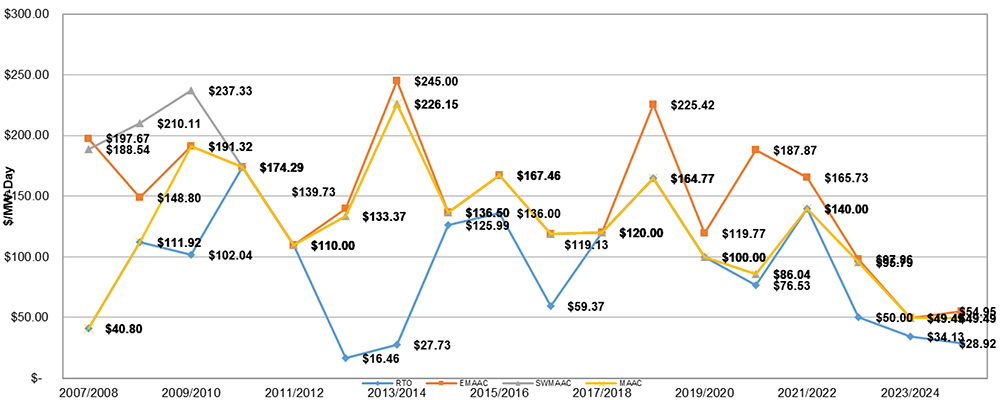Generation owners in PJM say that declining capacity prices and market participation in the Base Residual Auction, as shown by the results posted by the RTO on Monday, demonstrate underlying issues with the market.
“The auction results provide a long list of troubling indicators: supplier participation is down; more regions are in need of more capacity than they have; coal, wind, hydro and demand response are all leaving the market; and clearing prices are at near historic lows,” said Glen Thomas, president of the PJM Power Providers (P3).
Prices in the Rest of RTO region fell 18% to $28.92/MW-day from $34.13 in the previous auction, though the overall cost to procure the 140,416 MW in capacity cleared in the auction remained approximately the same at $2.2 billion because of higher prices in five constrained regions. (See PJM Capacity Prices Jump in 5 Regions.)
Pointing to a white paper released by PJM last week that raised reliability concerns with the pace of new generation construction and retirements, Thomas said declining prices show a disconnect in the market. (See PJM Board Initiates Fast-track Process to Address Reliability.)

“The tragic irony in all of this is that these results were announced just days after PJM published a report warning of looming reliability risks at least partially caused by the accelerated retirement of dispatchable generation necessary to maintain reliability,” he said. “Clearly, there is a disconnect between the market’s rules and outcomes it needs to produce to maintain reliability, and that must be fixed if PJM is interested in retaining the resources it has and incenting construction of the resources it will require as the reliability threats begin to emerge in the coming years.”
Following the posting of auction results, the Electric Power Supply Association (EPSA) said that it is satisfied enough capacity was procured, but the clearing prices still show a need for market changes.
“Once again, the results of this BRA demonstrate the need for a clear price signal for capacity resources,” the organization said. “The market must be designed properly and avoid rule changes intended to accommodate specific preferred resources or technologies. EPSA has long called on PJM leadership, policymakers and regulators to address the serious foundational issues at hand, and we stand ready to continue to provide recommendations and work collaboratively to forge a solution.”
Some of those same concerns were raised by stakeholders in the Resource Adequacy Senior Task Force on Tuesday as they embarked on discussions of how to create market design proposals in response to a letter from the PJM Board of Managers. The board published the letter concurrent with PJM’s white paper announcing a fast-track process for addressing concerns raised by the report and stakeholders in recent months. (See PJM Board Initiates Fast-track Process to Address Reliability.)
Stakeholders said the capacity prices, some of the lowest the RTO has seen, underline the importance of their work and implementing new rules as soon as possible. Much of the discussion centered around balancing the urgency some see in putting those new rules in place with the disruption of potential auction delays that may be necessary to do so.
Constellation and Vistra Report Cleared Capacity
Constellation Energy (NASDAQ:CEG) reported to the U.S. Securities and Exchange Commission that it had cleared 18,725 MW in the auction, nearly the same as its 2023/24 auction figures. Its nuclear fleet cleared 25 MW lower than the previous auction, when its Byron, Dresden and Quad Cities facilities returned to the market.
Vistra (NYSE:VST) announced that it had cleared 6,905 MW at a $43.25/MW-day weighted average clearing price. The company projects it will receive approximately $109 million in capacity revenues for the 2024/25 delivery year, as well as an additional $11 million to $15 million in existing retail and bilateral sales. Total revenues for the year are estimated at $120 million to $124 million, down from 2023/24, which was projected at $164 million to $169 million following the June auction.




